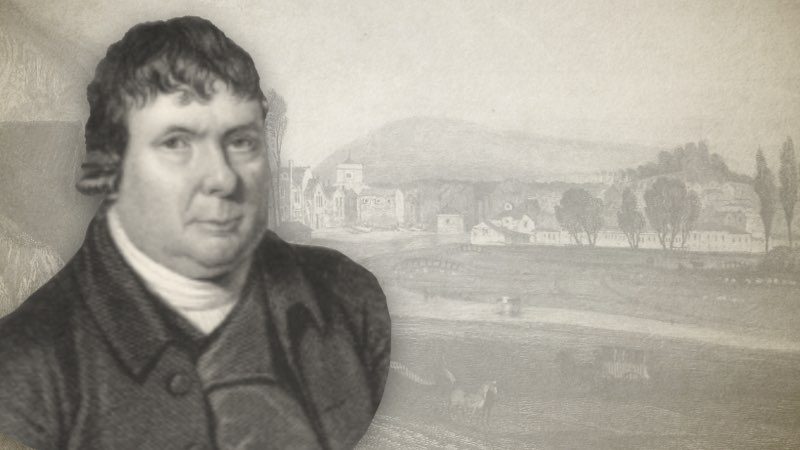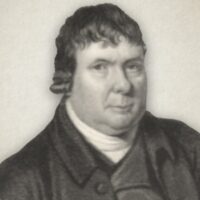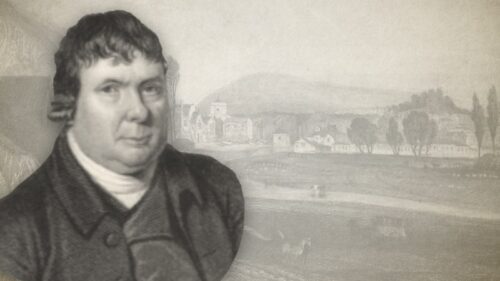
The Child of Liberty in Legal Bondage: Slavish Fear (2/11)
2. Of the fear that attends this spirit of bondage.
By which I do not mean filial fear; for that is a grace of the Holy Spirit, planted in the heart by him, and has the goodness of God in Christ for its object. This fear is a reverential awe of a good and gracious God, that presents us under his watchful eye, and him always before our eyes. This fear is a little sentinel, one of the post army of grace, Song vi. 13. For the church is a company of two armies, grace and corruption, which war against each other. This fear is to keep us from departing from God, in which we are counselled to walk. “My son, be thou in the fear of the Lord all the day long.”
When any danger appears; when any error is advanced and presented to us by Satan or his hawkers; or when any trap is set by enemies, intended to be a future handle of reproach; or any temptations to sin; this little-watchman, called fear, is upon his tower. He sounds the alarm, awakens the little camp, and will not let us proceed without well weighing matters. The understanding must be consulted, a proper judgment must be made of the case, a divine warrant must be obtained, the sentence of our judgment must be known, and the approbation of God and conscience must be had, or this little soldier will withstand us so that we cannot proceed, unless violence be offered to this diligent looker-out, which attends us in all company, and keeps upon our guard, so as to cut off the future occasion of enemies, and to forestall the devil’s market. But, if this grace be opposed violent measures, hardness of heart is sure to follow, and then we may pray as others have done, “Why hast thou hardened our hearts from thy fear?” Isaiah, lxiii. 17.
But this is not the fear that I am to treat of, nor yet the carnal fear of man, which is a sin of the human heart, and has the power and wrath of man for its object; which, when it awes a believer in his profession of Christ, is evil, and bringeth a share. “Fear not them which can kill the body.” Slavish fear is a principal ingredient in the spirit of bondage; which spirit of bondage is the wrath of God, and nothing else; and has the terrors of God, and his terrible majesty, for its object. And this fear works in the consciences of guilty sinners; in the fresh contracted guilt of real believers; and at times, without guilt, through the old man of sin, which works in all our members. This spirit of the law stirs up sin, and threatens us for it; and sin takes occasion by the law, and fights against that. The one is God’s anger against man’s sin, Zeph. ii. 3; and the other is man’s enmity against God, Rom. viii. 7.
This slavish fear, whenever it falls upon a believer, awakens all his intellectual powers with an alarm of fright, as if something dreadful was coming on, some strange thing happening unto him, or some awful judgment or calamity going to befall him. “The thing which I greatly feared is come upon me, and that which I was afraid of is come unto me,” Job, iii. 25. “My heart is pained within me, and the terrors of death are fallen upon me; fearfulness and trembling are come upon me, and horror hath overwhelmed me; and I said, O that I had wings like a dove!” Psalm Iv. 4, 5. My heart panted, saith the prophet; “Fearfulness affrighted me; the night of my pleasure hath he turned into fear unto me,” Isai. xxi. 4. “Fear came upon me, and trembling, which made all my bones to shake,” Job, iv. 14. “Let us make three tabernacles; one for thee, one for Moses, and one for Elias; for he wist not what to say, for they were sore afraid,” Mark, ix. 6. But there came a voice to them, saying, “This is my beloved Son, hear him.” By which voice the disciples were shewn which was the only way to get from this dreadful fear of the law.
Under the operations of this spirit of bondage to fear, God is not viewed as shining in the face of Jesus Christ. The new covenant characters of God, such as our God in covenant love, our Father in Christ, the portion of our souls, a present help, and a reconciled friend; which make him sweet and lovely to us, are quite out of sight and nothing but terrible majesty is seen or felt. Moses, though he was a choice believer in Christ before he left Egypt, Heb. xi. 24, was seized with this panic at the bush. “And Moses hid his face, for he was afraid to look upon God,” Exod. iii. 6. “And David could not go to inquire of God, for he was afraid,” 1 Chron. xxi. 30.
While this slavish fear works, the believer is confused, terrified, and always in a hurry. He can fix upon nothing; he can rest nowhere, thinking that every thing is wrong with him; that his faith is only feigned, and his love dissembled; his former claim upon God, as his God, presumption; his confession of him as such nothing but a lie; the goodness of his state, as he once thought, nothing but deception; all that viewed him as a believer were deceived by him; and he in the household of faith nothing but a hypocrite, deceived by Satan, and a deceiver of others.
Next comes a dreadful expectation of some evident token of perdition; and there is a looking for it, and a looking out after it. “My flesh trembleth for fear of thee, and I am afraid of thy judgment,” Psalm cxix. 120. “He will cut me off with pining sickness. I reckoned till the morning; that, as a lion, so will he break all my bones; from day even to night wilt thou make an end of me. I shall go softly all my years in the bitterness of my soul. I said, I shall not see the Lord, even the Lord in the land of the living; I shall behold man no more with the inhabitants of the world,” Isai. xxxvii. These were his last gasps and dying groans. “Enter not into judgment with thy servant, O Lord,” &c. saith the Psalmist. “He hath sealed up mine iniquity in a bag; I know that thou wilt not hold me innocent,” says Job. This is the workings of slavish fear, and is a principal ingredient in the spirit of bondage, which Paul calls the spirit of bondage to fear; which fear presents the wrath of God in view, and always has the displeasure of God for its object; which wrath is peculiar to mount Sinai, and under which all the bond- servants are, and which often influences even the child of God, and is no less than the reflection, of divine anger, reflected from “this glorious and fearful name, the Lord thy God,” Deut. xviii. 58.
Real believers are always conscious of their base original both by birth and practice; of the inward corruptions of their nature; the deceitfulness of their own hearts; their easily besetting sins: and their manifold weaknesses, infirmities, slips of the feet, slips of the tongue, and daily imperfections; all which have a tendency to betray them into this spirit of bondage to fear; which fear sometimes comes upon them where no fear is; as when good tidings are coming to us instead of evil. Hence the many checks and reproofs that are often given unto it in scripture. Carnal fear is rebuked by God himself. “Fear not, Abraham, I am thy shield; fear not, Jacob, to go down into Egypt, for I will be with thee there.” Slavish fear is rebuked by almost every angelic messenger of good news; which good news is to deliver us from legal fear, and to bring gospel love and joy to us. Fear not, ye shepherds, for I bring you good tidings of great joy. Fear not Zachariah, for thy prayers are heard. Fear not, Daniel, for thou art greatly beloved. Fear not, Mary, for thou hast found favour with God; which favour in Christ is to remove God’s anger in the law. Fear not, ye women, for I know ye seek Jesus which was crucified. It is I (saith the Saviour), be not afraid.
This yoke often falls heavy upon the necks of believers when God smites a hypocrite who has formerly stood high in the poor believer’s favour, and in outward shew appeared eminent for piety. God smote Uzza for his error in staying the ark, and David was afraid of God on that day. This act of striking Uzza with immediate death was to shew David that the mercy-seat needs no assistance from an arm of flesh; for God is not seated on a throne of grace to receive help and strength from man, for he needs none; but to give help and strength to man in every time of his need. David himself erred in this matter as well as Uzza; for the ark was drawn by beasts upon a cart, instead of being carried by consecrated priests upon their shoulders. This copy David took from the Philistines, not from Moses. And so the yoke of slavish fear brought David to use his filial fear, and the object of it, with a little more caution, respect, and reverence. This error David confesses. “And David said unto them, Ye are the chief of the fathers of the Levites sanctify yourselves, both ye and your brethren, that ye may bring up the ark of the Lord God of Israel unto the place that I have prepared for it. For because we did it not at the first the Lord God made a breach upon us, for that we sought him not after the due order,” 1 Chron. xv. 12, 13. Thus, when Christ informed the apostles of the treachery of Judas, every one, in fearful surprise, suspecting the deceit of his own heart, cried out, Lord, is it I? And, when Ananias and Saphira were struck dead, “great fear came upon all the churches.” And so now, when a hypocrite is discovered, and smitten with madness, given up to a fearful looking for of judgment, or left to himself to commit suicide; this yoke of slavish fear often falls upon them that fear God; which sometimes moves them to self-examination, to humble confession, to private prayer, to greater diligence, and to learn a little how to read and judge of professors; and so is among the all things [that] “work for them that love God, and are the called according to his good to purpose.” Once more, the laws and rules, which a weak believer prescribes to himself to walk by, and the vows, promises, and resolutions which he is too apt to make, and more apt to break, these often betray him into this species of bondage. I come now,
William Huntington (1745-1813) was an English Calvinist preacher and prolific writer. His influence spread across the country and denominational lines. John Hazelton wrote of him—
“He published one hundred books, large and small, and once mentions being "weary at night, after having been hard at writing for fifteen hours during the day." Henry Cole wrote of him—‘’It may be asked why in my ministration, such as it is, I make frequent allusion to the ministry of that great and blessed servant of the Most High, the late Mr. Huntington. The reasons are these—1st. Because I believe he bore and left in Britain the greatest and most glorious testimony to the power of God's salvation that ever was borne or left therein. 2nd. Because I believe he planted the noblest vine of a Congregational Church that ever was planted therein; and 3rd. Because I believe the Churches that maintain the vital truths he set forth form a very essential feature in the Church-state of Christ in the land in these times, and perhaps will do so to the time of the coming day of God's retribution."
William Huntington, The Child Of Liberty In Legal Bondage (Complete)




